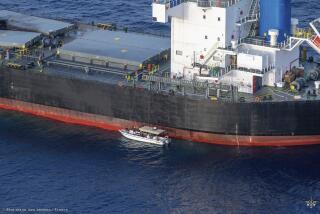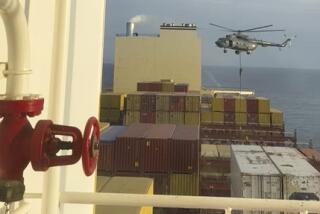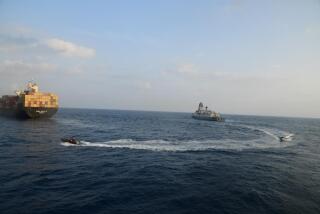Ship Seized; N. Korean Arms Found
WASHINGTON — Spanish authorities seized a merchant ship in the Arabian Sea on Tuesday and discovered about a dozen North Korean Scud missiles and extra missile parts, U.S. officials said.
Preliminary evidence suggested that the ship was headed for Yemen and not Iraq. Analysts said Yemen might have been a transfer or resale point.
With tensions growing in the region because of possible U.S. action against Iraq, the seizure raises important questions about how and when the United States will enforce its promise to intercept shipments of weapons of mass destruction -- particularly items such as missiles, whose sales are not banned under international law.
Some analysts also saw the action as an indication of a stiffening U.S. resolve to pressure North Korea to abandon its nuclear program by cutting the nation off from its customers for lucrative missile sales.
“If they’re shipping missiles, we’re going to do what we can to stop them,” a senior administration official said.
U.S. intelligence had been tracking the ship for some time before a Spanish vessel intercepted it about 600 miles east of the Horn of Africa. The fate of the ship and the crew members, who identified themselves as North Korean, was unclear Tuesday, officials said.
Analysts said the missiles could have been destined for one of North Korea’s other suspected arms clients, which include Pakistan, Iran, Egypt, Libya and Syria. Iraq used Scuds against Israel and Saudi Arabia in the 1991 Persian Gulf War, and some Soviet-era Scuds have ended up in terrorist hands.
The vessel was boarded in international waters because it carried no national flag and was suspected of illicit activity, U.S. officials said. The Spanish authorities were believed to be part of a multinational force patrolling the area to enforce United Nations sanctions against Iraq, but that was not why the ship was boarded, a U.S. government source said.
“They were following a strange course, they had painted over the name [of the vessel] and taken off their flags,” the senior administration official said.
“When the Spanish attempted to figure out who they were and what they were doing, they started taking evasive measures,” the government source said.
A ship not flying a flag is effectively stateless -- and thus in violation of international maritime law and fair game to be boarded by any other vessel, said John Ellison, a maritime lawyer at Anderson Kill & Olick in Philadelphia.
The United States and other nations routinely stop ships on the high seas if the vessels are believed to be running drugs or other illicit cargo, and may fire across their bows to force them to halt, the senior administration official said. But authorities contact either the government of the nation in which the ship is registered or the ship owner before boarding the vessel.
This ship was essentially a pirate vessel that could claim no sovereign protection.
“That’s just a big mistake,” Ellison said. “I bet that’s not going to happen again.”
U.S. military officials are now on board, and authorities are talking to “a number of different parties” -- presumably including Spain, North Korea or its intermediaries, and nearby port officials -- about what to do.
“Presumably somebody owns the cargo,” the administration official said.
“It’s not clear what happens now,” the government source said. “We’re still in the information-gathering stage.”
Iran and Pakistan have been North Korea’s best clients for ballistic missiles, said Joel S. Wit, a former State Department expert on Korea who is now at the Center for Strategic and International Studies in Washington. “Yemen has bought Scuds ... and missile parts, but I wouldn’t characterize them as a major client.”
Officials identified the missiles on the ship as Scuds, which have a range of about 180 to 300 miles.
The Clinton administration tried using the threat of sanctions against missile buyers, but the penalties were not sufficiently great, said Robert J. Einhorn, who was a State Department official in the Clinton administration and is now also at the Center for Strategic and International Studies.
“This administration has decided it wanted a more effective and muscular approach to stopping these North Korean exports,” Einhorn said.
Wit said the Bush administration’s strategy appeared designed to encourage North Korea’s neighbors to pressure it to stop its uranium enrichment program, while at the same time trying to cut off the cash-starved regime in Pyongyang from would-be weapons buyers.
The administration had been trying to crack down on North Korean missile exports long before Pyongyang’s admission this fall that it had a secret program to enrich uranium, but it is extremely difficult to halt such exports without very good intelligence to justify stopping and searching ships at sea, former officials said.
“It could be that the administration is now assigning a higher priority” to gathering such intelligence, said Mitchell Reiss, a former National Security Council official who is now dean of international affairs at the College of William & Mary in Williamsburg, Va.
In 1993, the United States suspected a Chinese merchant ship, the Yinhe, which was traveling from China to Iran, of carrying chemicals that could be used to make poison gas. Washington arranged for the ship to be searched in Saudi Arabia. The inspection strained relations with the Chinese and turned up no chemical weapons materials.
Richard L. Armitage, deputy secretary of State, has justified the searching of ships, citing the right of self-defense as specified in the U.N. Charter.
The nightmare scenario is that North Korea could ramp up its nuclear program, generate enough enriched uranium for 20 to 30 bombs per year, and start exporting the surplus, Reiss said.
“If it’s so difficult to stop the export of ballistic missiles, which are big and bulky, and we know where the production facilities are, we hope, how much more difficult is it going to be to stop the export of nuclear weapons-grade material or even assembled bombs?” Reiss said.
“This incident raises the question of how very difficult it is to stop the export of sensitive technology,” he added. “Is North Korea violating any laws by exporting these ballistic missiles? Absolutely not. So this is a useful step for the U.S., but it doesn’t solve the underlying problem.”
That approach may not go over well in South Korea, where anti-Americanism is on the rise and the lame-duck administration of President Kim Dae Jung favors a diplomatic resolution to the North Korean nuclear issues.
Armitage met with Kim in Seoul on Tuesday to explain U.S. policy on Iraq and North Korea. A U.S. official said he briefed Kim on the ship situation before news of the intercept became public.
“We reaffirmed our common interest in finding a diplomatic solution to North Korea’s destabilizing pursuit of nuclear and other weapons,” Armitage said.
Kim apparently was unswayed by Armitage’s position that dialogue should not continue until the North has shown evidence of giving up its nuclear program. According to Kim’s spokeswoman, the president replied to Armitage, “We must strengthen diplomatic efforts.”
There was no official reaction early today to the ship’s interception. One prominent analyst with ties to the Kim administration said the export of Scuds to Yemen was nothing new.
“You wonder why the Bush administration is making this an issue at this particular time,” said Lee Jong Seok, an expert on North Korea. “It has been known for years that North Korea is exporting missiles. The United States is an exporter of missiles, too.”
Times staff writer Barbara Demick in Seoul contributed to this report.
More to Read
Sign up for Essential California
The most important California stories and recommendations in your inbox every morning.
You may occasionally receive promotional content from the Los Angeles Times.










